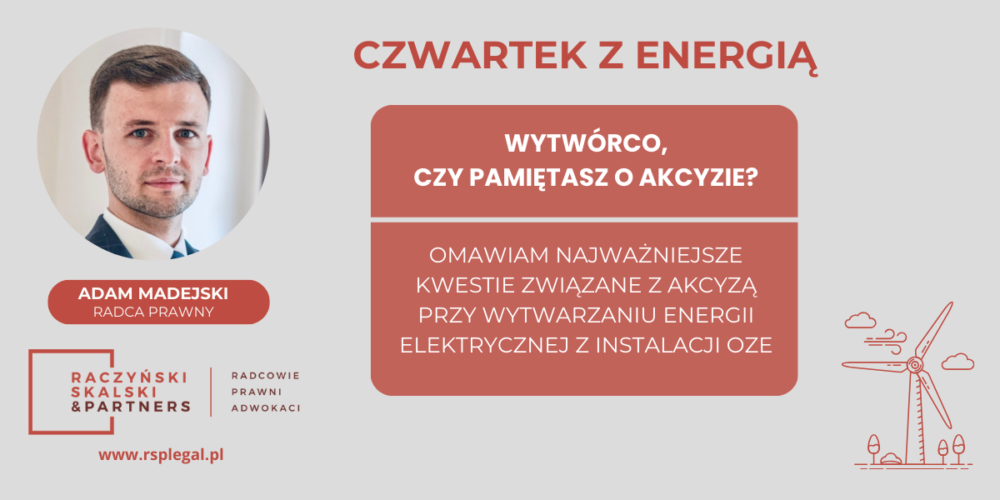Generators attach great importance to fulfilling regulatory obligations related to the operation of RES installations. Issues such as proper execution of the construction process or obtaining the necessary entries or decisions are almost universally known. However, it is worth remembering that the fact of generating electricity entails significant obligations under the Excise Tax Act. Although not every generator will be obliged to pay excise tax, it is worth comprehensively analyzing your situation in terms of the existence of reporting and record-keeping obligations established by the Excise Tax Act. I outline the practical aspects of a generator’s RES installation activities on excise tax grounds.
1. Excise tax exemption for a generator in a RES installation
The construction of the provisions of the Excise Tax Law indicates the existence of a general obligation to pay excise taxes by all entities that generate electricity – this follows from Article 9 (1) (3) and (4) of the Excise Tax Law. According to this provision, any entity that consumes electricity, regardless of whether it has a license to generate electricity or not, is obliged to pay excise taxes. This is because the subject of taxation is the act of consuming the electricity generated, which means that the obligation includes self-consumption.It is worth noting, however, that in addition to the consumption of electricity, the excise tax also applies to its sale, but only to final purchasers. Thus, if the generator sells all of the electricity to a trading company, such as an obligated seller or a seller of choice, then no excise duty obligation will arise.
The most relevant in the context of the excise duty for the generator is the exemption referred to in § 5(1) of the Regulation of the Minister of Finance, Funds and Regional Policy on Excise Tax Exemptions. According to this provision, any generator that produces energy in generators with a total capacity not exceeding 1 MW is exempt from paying excise taxes on the electricity generated and consumed. Thus, if a generator operates two RES installations with a capacity of 0.6 MW each, the exemption from § 5(1) of the Excise Tax Exemption Regulation will not apply.
2. Reporting and documentation obligations
In the case of electricity generation and consumption for own consumption, it is necessary for the generator to submit a registration notification to the relevant tax office – this obligation is carried out through the Central Register of Excise Entities. The obligation to register does not apply to generators who enjoy the subjective exemption from § 5(1) of the Excise Tax Exemption Ordinance (Article 16(7a)(1) of the Excise Tax Law). In addition, the obligation to register and pay excise tax is not extended to generators who sell all electricity generated to entities other than final buyers (i.e., trading companies, obligated sellers, for example). The exception, however, will be the situation in which there is simultaneous self-consumption and sale of surplus electricity – if the total capacity of all installations exceeds 1 MW, then the registration obligation will be valid.
Importantly, registration must be made before the first taxable activity, which in the case of electricity generation means the period before the installation’s technological start-up and the first introduction of energy into the grid (Article 16(1)(1) of the Excise Tax Law).
The generator’s other excise tax obligations further include:
- submitting monthly reports, and
- keeping quantitative records of the electricity generated.
The obligation to file tax returns is monthly – (Article 24, paragraph 1, item 3 of the Excise Tax Law). However, if the generator is entitled to a subjective exemption from Section 5(1) of the Excise Tax Exemption Ordinance, then the reporting obligation will not occur (Article 24(3) of the Excise Tax Law).
The second important activity that the generator should take care of is keeping quantitative records of the electricity generated (Article 138h, paragraph 1(2) of the Excise Tax Law). The records should be kept on the basis of indications of metering and billing systems and, if there are none, on the basis of billing documents (Article 138h(4) of the Excise Tax Law). The records should include the amount of electricity generated to four decimal places, expressed in MWh. The data collected should cover monthly periods (Article 138h(5) of the Excise Tax Law). As in the case of other obligations, generators operating installations with a total capacity not exceeding 1 MW will also benefit from an exemption as to the obligation to keep quantity records – this follows from Article 138h(2) of the Excise Tax Law.



